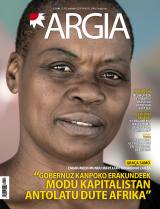"Burning a closet in the village was more than a symbolic act"
- I'm Joseba Verdugo Goikoetxea, 26. I've been militating for 10 years in the LGTBI movement and I'm a member of the Lugatibe collective.

At the age of 16, I started every week to go by bus from town to Pamplona and then to meet the members of Kattalingorri, for me it was a great liberation. Everyone had their own experiences, we met people of different ages and points of view.
Since then, I've seen a lot of changes; in 2011, we put together a group of similar ideology and created Lugatibe. It is an assembly of transmarikabollo and queer youths from Pamplona, apolitical and self-managed.
The militancy, in addition to the political outcry, has given me the support, the network and the group of friends; and many important moments of my life. It comes to mind that a few years ago we burned a closet in the town square with the feminist group there, it was special, much more than a symbolic action. It helped me a lot in the process of empowerment, getting out of the hiding place of my house in the villages is a big step.
The change has been noted in Navarre in the last two years, as non-involved organizations have had a direct relationship with LGTBI collectives. An example of this is the Kattalingune Care Service, the Administrative Unit for Care of Sexual and Gender Diversity that was just opened in May or the LGTBI Foral Law that will be approved this month.
All of this is to be welcomed, because having protocols and laws in favor is an advantage, but I think we have to walk carefully, we cannot relax and forget about the street. Laws and rights can be lost as they win and are often not enough. The law against male violence, for example, was an achievement, but it is clear that it has many gaps. The people of Lugatiba have distanced us a little, because we are completely suspicious of the powers they have exercised against us over the past few centuries.
When I was kissing at a nightclub in Pamplona in my teenage years, they insulted me, spit and spit ice. So he didn't have tools or networks of protection, and the local janitor threw us out, saying he was the creator of the riots.
It seems that since then things have changed, but a year and a half ago, a group of boys and girls insulted us and threatened us by the same action in the Casco Viejo de Pamplona. The answer was another, we were with Lugatibe members and we started kissing each other. They continued to threaten, but we received the support of the street people and they left. We decided to report it to the Foral Police, the treatment was right, but the agent did not know how to act in the face of such an aggression and classified ours as an attack on religious or ethnic groups. That is why I believe that, despite the need for legal protection, it is also important to promote social protection.
I don't feel safe in cities and places I don't know. We move in comfort zones because it's easier to move in the bubble. They want to make it look like it's overtaken, but it's not true, there's a lot to do. In Madrid, the capital of homosexuality, homophobic attacks of varying intensity occur every day.
In this regard, I am frightened by the rise of the extreme right, which is spreading throughout the world. Racism, homophobia and machismo are being reaffirmed. The bus from Erse Escuchar is a clear example of the fact that neomachism is gaining strength and has behind it religious, political and economic support.
We should make collective self-criticism. In the gay movement there is depoliticization, through pinkwashing we have entered the era of the instrumentalization of LGTBI, to which we must add that capitalism sees us as a travelling euro. Companies have seen a large market and Pride Day has become a tribute to it.

























